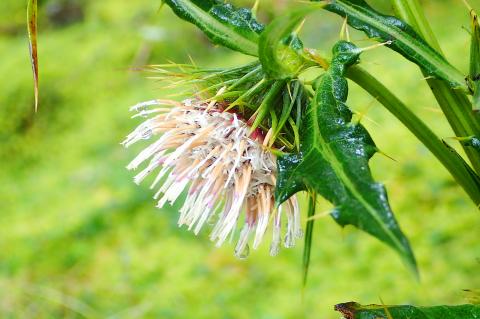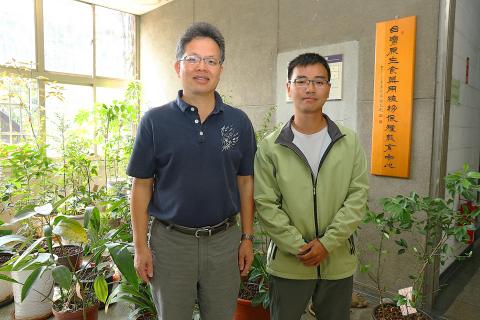A flower species depicted on the NT$1,000 banknote that is commonly believed to be a Yushan thistle is actually a newly discovered species of Cirsium, academics said on Saturday.
Chang Chih-yi (張之毅), a doctoral candidate at National Chung Hsing University’s forestry department, said that the flower is a Cirsium tatakaense — a species endemic to south-central Taiwan that he and his team discovered.
Chang and his supervisor, associate professor Tseng Yen-hsueh (曾彥學), published their findings after five years of research in the international academic journal PhytoKeys on Feb. 14.

Photo courtesy of National Chung Hsing University
The Cirsium tatakaense, which grows in the Tataka area (塔塔加) in Yushan National Park and is often photographed by visitors, can easily be mistaken for the similar-looking Yushan thistle, the two men said.
The flower has yet to be seen outside of the park at altitudes of 2,000m to 3,000m above sea level, they said.
The best place to see the flower is in open areas along the roads near the Tataka Visitor Center, they said, adding that it is in season from August to October.

Photo courtesy of National Chung Hsing University
The flower’s leaves are more slender than those of the Yushan thistle and it has more petals, they said.
The Cirsium tatakaense has a thornier and longer stem, which is easily distinguishable from that of the Yushan thistle, and its petals are white, droop when in bloom and have sharp toothpick-like thorns surrounding their base, they said.
The researchers also examined pollen samples from the two plants and found that the Cirsium tatakaense has much larger grains of pollen.
Although the number of Cirsium tatakaense is low, there is little danger of the plant becoming extinct, as the remoteness and high elevation of its habitat means it is protected from human activity, Chang and Tseng said.
However, climate change could affect the flower’s growth, so efforts should be made to conserve the plant, the academics said.

Taiwan is to commence mass production of the Tien Kung (天弓, “Sky Bow”) III, IV and V missiles by the second quarter of this year if the legislature approves the government’s NT$1.25 trillion (US$39.78 billion) special defense budget, an official said yesterday. Commenting on condition of anonymity, a defense official with knowledge of the matter said that the advanced systems are expected to provide crucial capabilities against ballistic and cruise missiles for the proposed “T-Dome,” an advanced, multi-layered air defense network. The Tien Kung III is an air defense missile with a maximum interception altitude of 35km. The Tien Kung IV and V

The disruption of 941 flights in and out of Taiwan due to China’s large-scale military exercises was no accident, but rather the result of a “quasi-blockade” used to simulate creating the air and sea routes needed for an amphibious landing, a military expert said. The disruptions occurred on Tuesday and lasted about 10 hours as China conducted live-fire drills in the Taiwan Strait. The Civil Aviation Administration (CAA) said the exercises affected 857 international flights and 84 domestic flights, affecting more than 100,000 travelers. Su Tzu-yun (蘇紫雲), a research fellow at the government-sponsored Institute for National Defense and Security Research, said the air

Taiwan lacks effective and cost-efficient armaments to intercept rockets, making the planned “T-Dome” interception system necessary, two experts said on Tuesday. The concerns were raised after China’s military fired two waves of rockets during live-fire drills around Taiwan on Tuesday, part of two-day exercises code-named “Justice Mission 2025.” The first wave involved 17 rockets launched at 9am from Pingtan in China’s Fujian Province, according to Lieutenant General Hsieh Jih-sheng (謝日升) of the Office of the Deputy Chief of the General Staff for Intelligence at the Ministry of National Defense. Those rockets landed 70 nautical miles (129.6km) northeast of Keelung without flying over Taiwan,

A strong continental cold air mass is to bring pollutants to Taiwan from tomorrow, the Ministry of Environment said today, as it issued an “orange” air quality alert for most of the country. All of Taiwan except for Hualien and Taitung counties is to be under an “orange” air quality alert tomorrow, indicating air quality that is unhealthy for sensitive groups. In China, areas from Shandong to Shanghai have been enveloped in haze since Saturday, the ministry said in a news release. Yesterday, hourly concentrations of PM2.5 in these areas ranged from 65 to 160 micrograms per cubic meter (mg/m³), and pollutants were